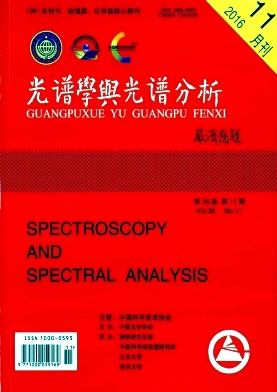红外光谱结合化学计量学方法快速鉴别牛肝菌种类及总汞含量分析
[1] LI Yu(李 玉). Edible and Medicinal Mushrooms(食药用菌), 2011, 19(1): 1.
[2] LI Tai-hui, SONG Bin(李泰辉, 宋 斌). Journal of Edible Fungi(食用菌学报), 2002, 9(2): 22.
[3] DAI Yu-cheng, ZHOU Li-wei, YANG Zhu-liang, et al(戴玉成, 周丽伟, 杨祝良, 等). Mycosystema(菌物学报), 2010, 29(1): 1.
[4] Wang X M, Zhang J, Wu L H, et al. Food Chemistry, 2014, 151: 279.
[5] ZHANG Qun, YANG Xiao-fang(张 群, 杨晓方). Technology and Market(技术与市场), 2013, 5: 316.
[6] Heleno S A, Ferreira R C, Antonio A L, et al. Food Bioscience, 2015, 11: 48.
[7] Jarzyńska G, Falandysz J. African Journal of Biotechnology, 2014, 11(20): 4588.
[8] Ulziijargal E, Mau J L. International Journal of Medicinal Mushrooms, 2011, 13(4): 343.
[9] Thatoi H, Singdevsachan S K. African Journal of Biotechnology, 2015, 13(4): 523.
[10] Cheung P C K. Nutrition Bulletin, 2010, 35(4): 292.
[11] LI Shu-hong, ZHAO Yong-chang, YU Fu-qiang, et al(李树红, 赵永昌, 于富强, 等). Edible Fungi of China(中国食用菌), 2011, 30(5): 34.
[12] Liu B, Huang Q, Cai H, et al. Food Chemistry, 2015, 188: 294.
[13] Kalac P. Food Chemistry, 2010, 122(1): 2.
[14] Falandysz J, Kowalewska I, Nnorom I C, et al. Journal of Environmental Science and Health, Part A, 2012, 47(11): 1695.
[15] Guallar E, Sanz-Gallardo M I, Veer P, et al. New England Journal of Medicine, 2002, 347(22): 1747.
[16] Trasande L, Landrigan P J, Schechter C. Environmental Health Perspectives, 2005, 113(5): 590.
[17] Adams D H, Sonne C, Basu N, et al. Science of the Total Environment, 2010, 408(23): 5808.
[18] Jarzyńska G, Falandysz J. Journal of Environmental Science and Health Part A, 2011, 46(6): 569.
[19] Bernalte E, Salmanighabeshi S, Rueda-Holgado F, et al. International Journal of Environmental Science and Technology, 2015, 12(3): 817.
[20] YE Hui-xuan, TAN Zhou, LIU Xiang-qian, et al(叶惠煊, 谭 舟, 刘向前, 等). Food Science(食品科学), 2014, 35(4): 151.
[21] YANG Jia(杨 佳). Authenticity, Adulteration and Quality Analysis of Sesame oils by Fourier Transform Infrared Spectroscopy(傅里叶变换红外光谱技术在芝麻油真伪鉴别, 掺伪与品质分析中的应用). Beijing: Beijing Forestry University(北京: 北京林业大学), 2013.
[22] Gok S, Severcan M, Goormaghtigh E, et al. Food Chemistry, 2015, 170: 234.
[24] Kwon Y K, Jie E Y, Sartie A, et al. Food Chemistry, 2015, 166: 389.
[25] SHAO Xue-guang, NING Yu, LIU Feng-xia, et al(邵学广, 宁 宇, 刘凤霞, 等). Acta Chimica Sinica(化学学报), 2012, 70(20): 2109.
[26] ZHU Xiang-rong, LI Gao-yang, HUANG Lü-hong, et al(朱向荣, 李高阳, 黄绿红, 等). Chinese Journal of Analytical Chemistry(分析化学), 2015, 4: 029.
[27] Oudghiri F, García-Morales J L, Allali N, et al. International Journal of Environmental Research, 2014, 8(4): 1093.
[28] Li J, Zhang Y, Cai W, et al. Talanta, 2011, 84(3): 679.
[29] NING Yu, CAI Wen-sheng, SHAO Xue-guang(宁 宇, 蔡文生, 邵学广). Chemical Journal of Chinese Universities(高等学校化学学报), 2012, 33(04): 673.
[30] Zhu X, Li G, Shan Y. International Journal of Food Science & Technology, 2015, 50(5): 1123.
[31] Moros J, Vallejuelo S F O, Gredilla A, et al. Environmental Science & Technology, 2009, 43(24): 9314.
[32] Wiejak A, Wang Y, Zhang J, et al. Journal of Environmental Science and Health, Part B, 2014, 49(11): 811.
杨天伟, 张霁, 李涛, 王元忠, 刘鸿高. 红外光谱结合化学计量学方法快速鉴别牛肝菌种类及总汞含量分析[J]. 光谱学与光谱分析, 2016, 36(11): 3510. YANG Tian-wei, ZHANG Ji, LI Tao, WANG Yuan-zhong, LIU Hong-gao. Infrared Spectroscopy Combined with Chemometrics for Rapid Discrimination on Species of Bolete Mushrooms and an Analysis of Total Mercury[J]. Spectroscopy and Spectral Analysis, 2016, 36(11): 3510.



